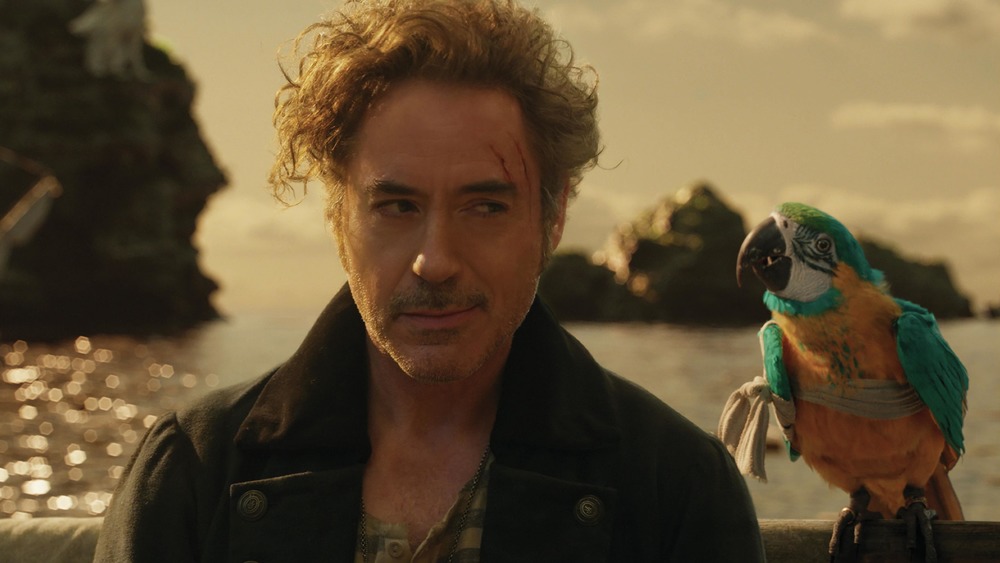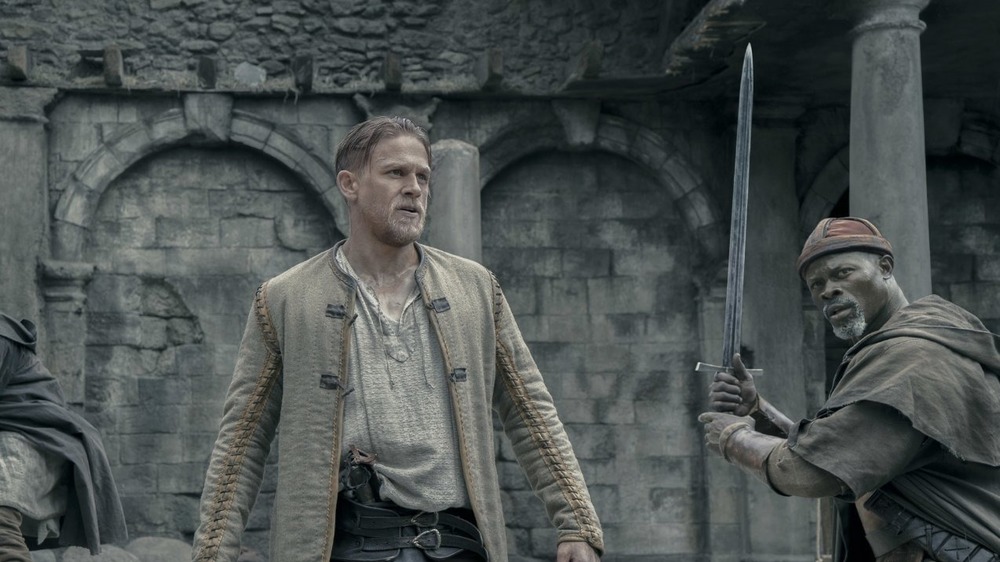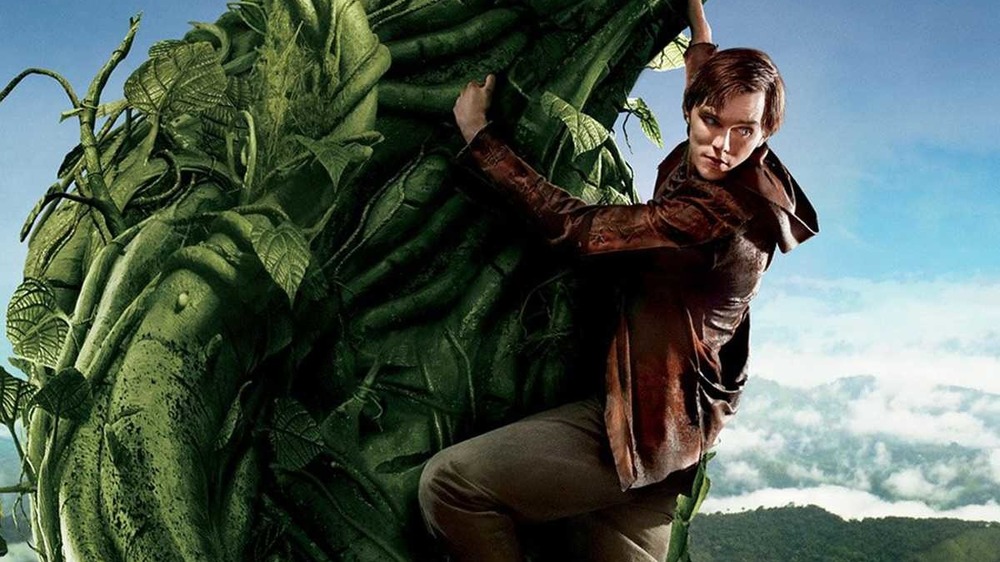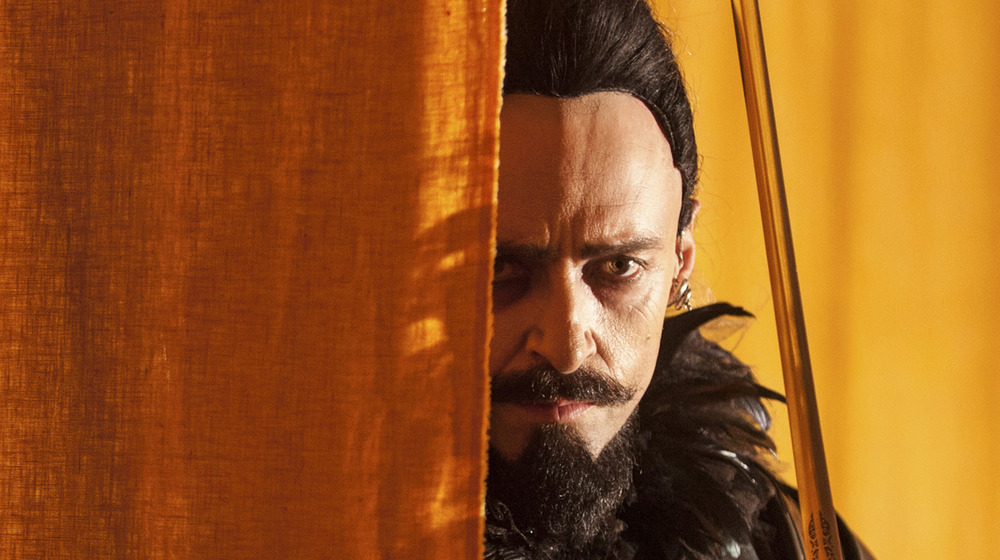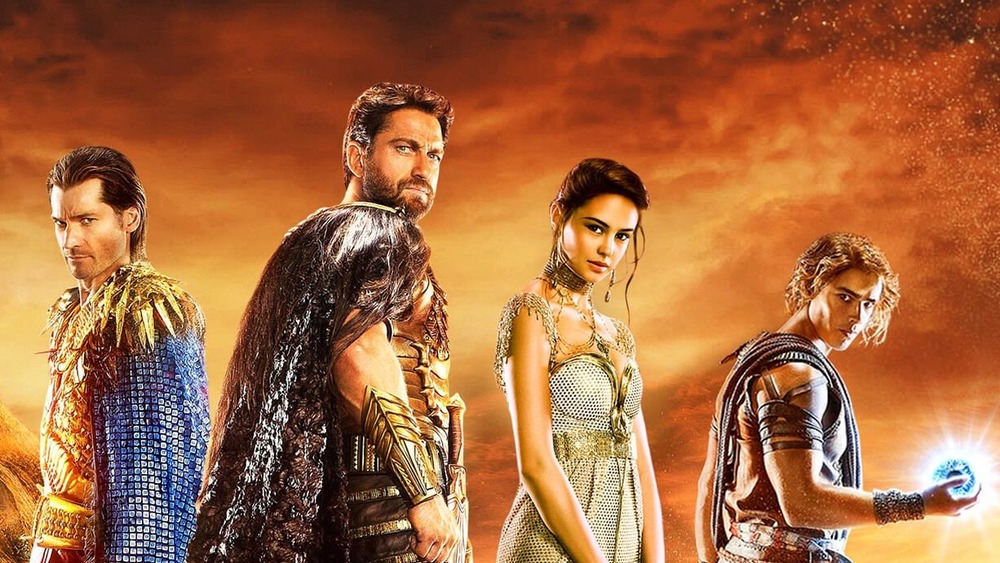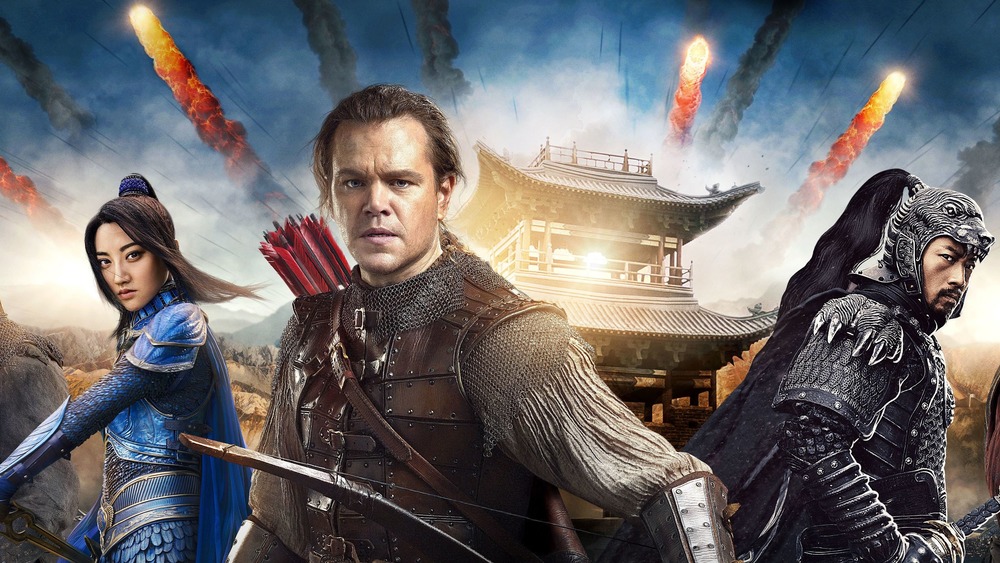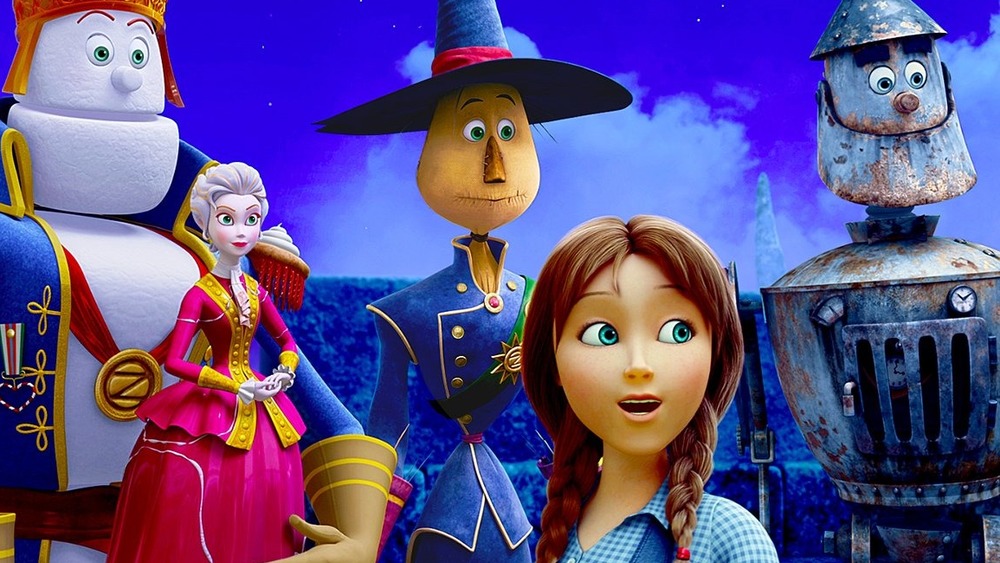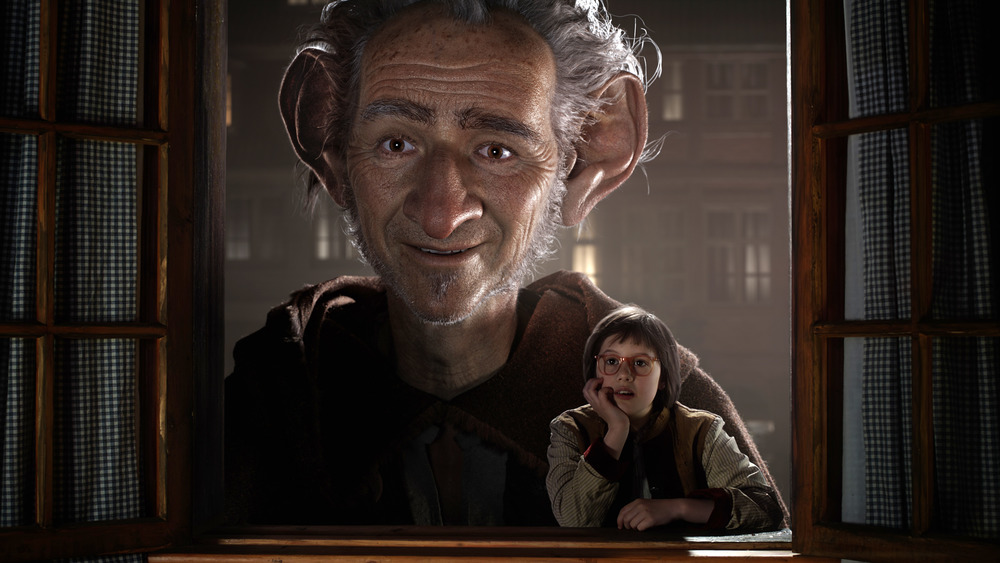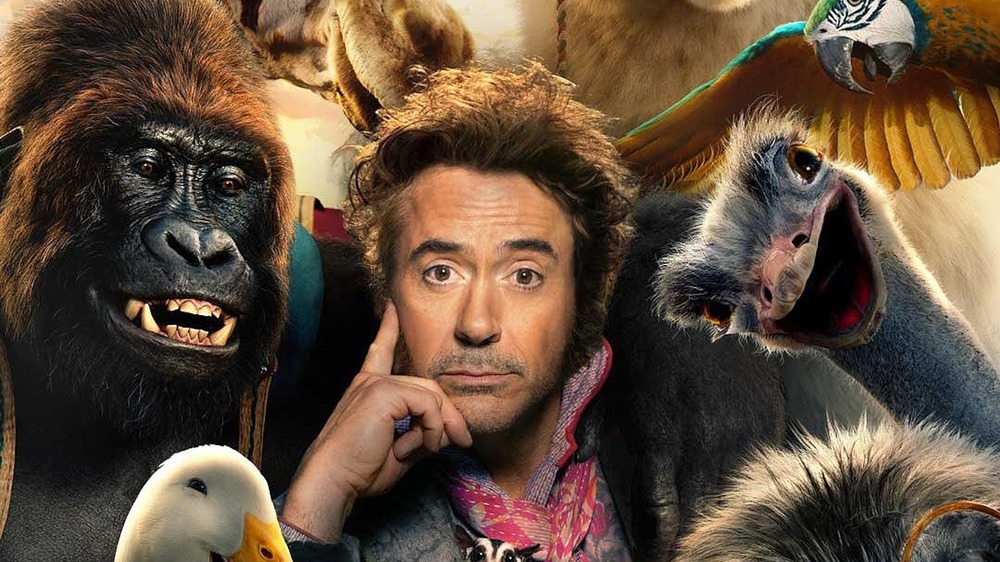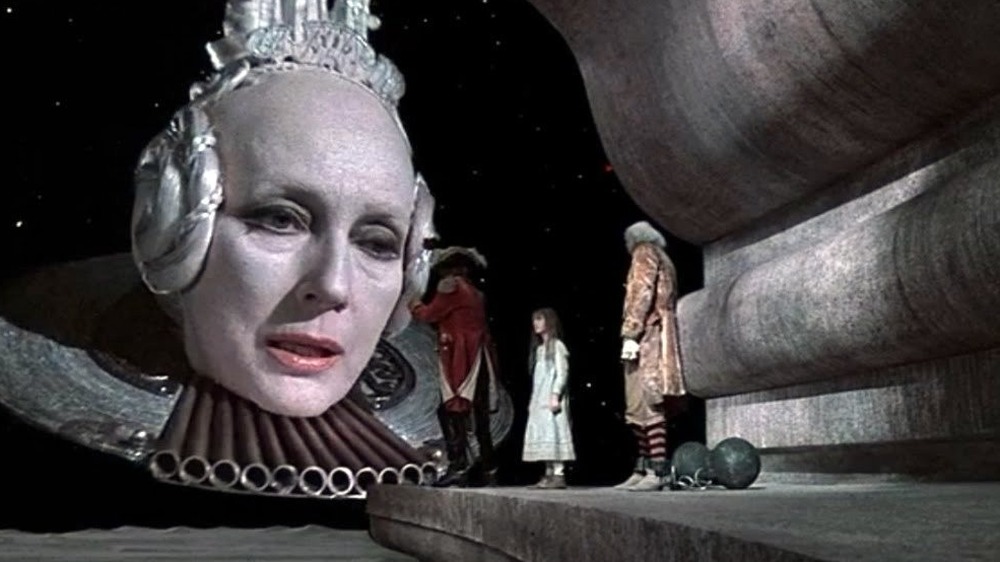Fantasy Movies That Bombed Hardest At The Box Office
At the dawn of the 21st century, the fantasy genre's standing at the box office changed dramatically. Thanks to the first Harry Potter and Lord of the Rings installments, live-action fantasy movies — a genre that had never previously produced a movie that grossed over $120 million at the domestic box office — was suddenly one of the most important genres around. In the two decades since, the world of fantasy cinema has continued to produce box office juggernauts, particularly once Disney began remaking their animated fantasy movies as live-action blockbusters.
But even the sturdiest genres have produced their fair share of box office misfires. Both before and after they became a hot Hollywood commodity, fantasy films were just as vulnerable as any genre to delivering a box office flop. Sometimes, these box office duds were the victims of poor marketing, others suffered from a bad release date and still others experienced financial misery because of studio politics. Whatever the reasons, these films serve as a reminder that not every live-action fantasy movie can be the next Thor: Ragnarok at the box office.
King Arthur: Legend of the Sword was not box office royalty
In 2009, director Guy Ritchie delivered Sherlock Holmes, which turned the famous sleuth into a modern-day blockbuster character. The Warner Bros. film may not have been adored by Sir Arthur Conan Doyle purists, but it proved Ritchie could use his distinct style of filmmaking to deliver a crowdpleasing reimagining of an iconic literary character. In 2017, he tried to make that lightning strike twice for Warner Bros. with an adaptation of the King Arthur story titled King Arthur: Legend of the Sword.
Unfortunately, King Arthur was nowhere near as successful as Sherlock Holmes or any other lucrative blockbuster. Grossing just $148.7 million on a $175 million budget, King Arthur: Legend of the Sword ended up being the biggest money-loser of 2017 thanks to a projected $153.7 million price tag. King Arthur has had countless cinematic adaptations over the decades and Legend of the Sword failed to be different enough to justify its existence to audiences. The Guy Ritchie Sherlock Holmes also followed up other Holmes adaptations but its own tone felt unprecedented. Legend of the Sword, meanwhile, had marketing that made it look like a rehash of 2004's King Arthur movie. A poor release date – opening just one week after Guardians of the Galaxy Vol. 2 – cemented that King Arthur: Legend of the Sword wouldn't become the next Sherlock Holmes, not even with the presence of a character like Kung Fu George.
47 Ronin faded from memory
Prior to its release, the production troubles on 47 Ronin had already become legendary. Carl Rinsch's feature-length directorial debut went through multiple release dates before landing on a Christmas 2013 arrival. Those delays were due to 47 Ronin experiencing extensive behind-the-scenes turmoil, which included last-minute reshoots that drastically altered the movie and the removal of Rinsch from the post-production process. Of course, behind-the-scenes turmoil does not guarantee a dud. Sometimes, movies with fraught productions end up being classics, like The Wizard of Oz. But other times, it results in a landmark box office flop. The latter scenario was the case with 47 Ronin.
After opening to $20.3 million after its first three days of domestic release, it became apparent 47 Ronin was not going to work at the box office. Grossing $151.8 million on a gargantuan $175 million budget, it was projected that the film would end up losing $175 million for Universal Pictures. Its domestic performance was also unusually low for leading man Keanu Reeves, with the film, at the time, being only Reeves' second wide release since 2001 to gross under $40 million domestically. Considering 47 Ronin had to contend with The Hobbit: The Desolation of Smaug in its December 2013 theatrical release, it's no wonder it had trouble attracting fantasy moviegoers. However, a lackluster marketing effort from Universal and atrocious reviews only further sealed the box office fate of 47 Ronin, a movie tormented by problems before it even hit the screen.
Jack the Giant Slayer had no happy ending at the box office
"Jack and the Beanstalk" is one of the rare fairy tales to never get a definitive movie adaptation. Popular movies like Puss in Boots have cribbed certain details from the story about a boy and a land of giants above the clouds, but compared to Snow White and Cinderella, Jack's story is far less ubiquitous in cinema. It's unlikely we'll get many more attempts at translating "Jack and the Beanstalk" into a movie in the future, given the dreadful box office total of Jack the Giant Slayer.
An action/adventure take on the fairy tale starring Nicholas Hoult and Ewan McGregor, Jack the Giant Slayer hit theaters in March 2013 and opened to only $28 million domestically. Things didn't get much better once its theatrical run had concluded. In its lifetime worldwide box office run, Jack took in only $197.7 million, a dismal haul considering its massive $185 million budget. Part of the problem here was a release date that saw Jack opening a week before fellow fantasy blockbuster Oz the Great and Powerful. It also didn't help that it was hard to tell who the movie was for in its advertising. Trailers were full of material that was far too childish for adults yet not all that appealing to youngsters. In the end, Jack the Giant Slayer did no favors for the already lowly cinematic reputation of "Jack and the Beanstalk."
Pan failed to soar at the box office
Today, Pan is best known for one inexplicable scene: Peter Pan, upon first arriving in Neverland, is introduced to the nefarious pirate Blackbeard (Hugh Jackman) through a pirate crew singing a rendition of Nirvana's "Smells Like Teen Spirit." It's a puzzling, anachronistic moment in a movie that otherwise adheres to an old-fashioned sensibility. It's a moment destined to be shared as a GIF or clip across social media in the years to come as people who saw Pan as kids try to figure out if this "Teen Spirit" scene was a fever dream or not. Unfortunately, the rest of Pan was nowhere near as memorable as that sequence. This Joe Wright directorial effort was widely derided as a forgettable slog, which helps explain the film's dreadful box office performance.
Taking in only $151.5 million worldwide, Pan fell far short of expectations, especially since it carried a sizeable $150 million budget. But the tale of Peter Pan has never been guaranteed to light up the box office. Steven Spielberg's Hook did fine but wasn't the runaway smash everyone expected, while 2003's Peter Pan was an actual money loser despite decent reviews. Pan was just another in a long line of reminders to movie studios that Peter Pan is just not a character audiences flock to, even with a cover performance of a Nirvana song.
Financially, Gods of Egypt was all too mortal
The inherent job of marketing is to get people excited to see your movie. In that respect, the marketing team behind the trailers and posters for Gods of Egypt totally missed the mark. Rather than inspiring excitement, the marketing materials for this movie that made its whitewashed casting glaringly apparent only inspired scorn and ridicule from outlets like Forbes and Deadline. The mockery surrounding Gods of Egypt only increased once the incredibly disappointing box office returns began to flow in.
Grossing only $138.7 million worldwide, Gods of Egypt fell far short of being profitable on a mammoth $150 million budget. It was later declared one of Hollywood's biggest financial losses of 2016, with the film losing a projected $90 million. While the whitewashed casting helped put a damper on the film's financial prospects, it wasn't the only issue. The trailers and posters for this movie tended to rely on bizarre CG visuals, particularly the metallic forms of the Gods. These materials proved utterly incomprehensible to anyone unfamiliar with the film. Rather than give moviegoers any sense of a plot or tone, the promotional material for Gods of Egypt made it look like a cut-rate Playstation 3 game. With marketing this bad, no wonder Gods of Egypt went down in history as an all-time fantasy box office bomb.
The Great Wall's box office was anything but
With The Great Wall, Legendary Pictures hoped to create something that could resonate in the two biggest box office markets on Earth; the United States of America and China. The story about how The Great Wall of China was actually built to keep out an army of monsters, The Great Wall had both a high-concept idea and a star-studded cast that included Matt Damon, Willem Dafoe and Pedro Pascal. All of those notable qualities weren't enough, however, to make The Great Wall the box office success it was supposed to be.
The Great Wall only grossed $334.9 million worldwide and failed to leave much an impression at either the Chinese or domestic box office. Worse, on a $150 million budget, it ended up losing money for all its financiers, with one estimate projecting a loss of $75 million. The Great Wall had a number of problems that led to its box office demise, but chief among them was the miscasting of Matt Damon. Audiences like seeing him in tentpole fare, but his most successful blockbusters have been films like the Bourne movies or The Martian that have one foot rooted firmly in reality. Having Damon just react to CG monsters was not the kind of scenario audiences like to see the actor engage in. With a mishandled lead actor and a forgettable marketing campaign, The Great Wall ended up being a mass-appeal movie that appealed to no one.
Legends of Oz: Dorothy's Return had a legendarily bad box office run
Shortly after the release of Legends of Oz: Dorothy's Return, executive producer Greg Centineo explained to Animated Views what was behind the film's disastrous opening weekend. "We're nobodies in this industry," Centineo said about himself and the film's other creative participants. "And we stepped into a deep, deep ocean with some very, very big sharks. Some of those mainstream critics have not just trashed the movie, but literally tried to crush it. When you read how belligerent they are against the project...you don't have to be a rocket scientist to figure out something is wrong there."
While Centineo may see a nefarious conspiracy from film critics to blame for the box office woes of Dorothy's Return, a simpler explanation for the film's failure is simply Oz fatigue. Debuting just 15 months after Oz the Great and Powerful, it's doubtful family audiences were craving yet another Oz adventure. Dorothy's Return getting domestic distribution from the short-lived indie studio Clarius Entertainment rather than an outfit more experienced with releasing family fare also explains how this film made only $21.7 million on a $70 million budget. On top of all that, the marketing for Dorothy's Return made the project look like something geared exclusively towards the youngest of kids, thus limiting the film's appeal.
While Centineo has his own convoluted theories to explain Legends of Oz's box office shortcomings, it's apparent that other, simpler factors were dragging this film down.
Steven Spielberg swung and missed with The BFG
Steven Spielberg and Disney joined forces for the first time with The BFG, an adaptation of Roald Dahl's book of the same name. On paper, combining the might of the Mouse House with Spielberg would seem to be a recipe for surefire box office success. In reality, though, The BFG ended up being one of the biggest box office bombs of 2016 with a $195.2 million worldwide gross on a $145 million budget. As a comparison, The BFG made only $16 million more than the worldwide gross of Spielberg's far cheaper 2017 adult drama The Post.
The reasons for why The BFG got squashed at the box office are numerous. For one thing, Dahl's book just isn't as famous as other Dahl works like Charlie and the Chocolate Factory or Matilda. Another issue was that The BFG was released in a massively competitive time for family movies, coming out directly between Finding Dory and The Secret Life of Pets. The biggest problem of all, though, was marketing that relied too much on the name value of Disney and Spielberg. Audiences turned out for the biggest Disney or Spielberg movies because of the spectacle or emotions those movies delivered — not solely because of a family studio or filmmaker's name on the poster. Leaning too much on brand names, The BFG's marketing failed to offer up unique qualities of its own and it suffered greatly at the box office as a result.
Dolittle was a wild money-loser
Back in 1967, Rex Harrison headlined a Doctor Dolittle movie that turned into the stuff of Hollywood legend for all the wrong reasons. The production was a nightmare, it went over budget, and a slew of tie-in merchandise gathered dust on toy shelves everywhere. History seemed to repeat itself in 2020, when a new take on the story arrived via Dolittle. Though striking out with its own story and its own famous leading man in Robert Downey Jr., Dolittle evoked the Harrison film by being a startlingly large box office bomb.
Dolittle grossed just $251 million on a $175 million budget, a meager amount that put the film on track to lose a projected $100 million for Universal Pictures. What was supposed to be a new franchise for Downey Jr. turned into one of the biggest pop culture punchlines of 2020. What went wrong here, above all else, was the budget. Dolittle cost an obscene amount for a non-sequel. With that gargantuan price tag, it would have been difficult for Dolittle to thrive under the best of circumstances, let alone when saddled with toxic advance buzz.
In some ways, the world is very different than it was in 1967. But when it comes to big-budget Dolittle movies at the box office, the more things change, the more they stay the same.
The Adventures of Baron Manchusen was kept grounded
With The Adventures of Baron Munchausen, director Terry Gilliam was given access to more visual effects and a larger budget than he'd ever had before. Unfortunately, the use of all these tools ended up costing a pretty penny. Just over a year before its release, The Los Angeles Times noted that the film had turned into an "over-budget nightmare." Gilliam has delivered films throughout his career that have been beloved and highly influential. But they've also usually been niche affairs that don't attract enough moviegoers to justify the eventual massive (for its time) $47 million price tag of Baron Munchausen.
Then again, maybe Baron Munchausen would have crossed over if it had ever been given a chance to be seen by wider audiences. The film only grossed $8 million worldwide, all of that coming from its domestic performance. However, unlike many costly fantasy film flops, Baron Munchausen never got the chance to play in thousands of theaters or even in general wide release. Considering it never played in more than 126 locations, Baron Munchausen's performance was commendable, if still a money-loser. Gilliam would later recall how Baron Munchausen had been robbed of any chance to be a hit thanks to studio politics at its distributor Sony/Columbia, which refused to expand the film's theater count any further. While Baron Munchausen ended up being a flop, it was also the rare fantasy movie bomb that was clearly restrained from reaching its fullest potential.
